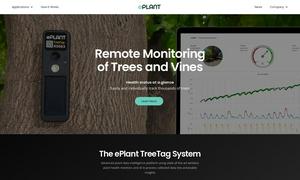
Discover the Best AI Tools to Boost Your Productivity
Find the Best AI Tools to Optimize Your Work and Personal Tasks
Best Agriculture AI Tools in 2024
What is Agriculture
The Agriculture Category in the AI Directory is pivotal for connecting farmers and agricultural companies to innovative AI-powered tools and resources. It enhances productivity, streamlines processes, and integrates cutting-edge technology for crop management, pest control, and sustainable farming practices, ultimately boosting food production efficiently.
How Agriculture works
The Agriculture Category operates by aggregating various AI-based resources tailored for agriculture. Users can access tools for crop monitoring, predictive analytics, and soil management through an intuitive platform. By utilizing these technologies, agricultural professionals can analyze data efficiently to make informed decisions, thereby increasing yield and minimizing waste. The integration of AI in agriculture aids in streamlining processes and ensuring sustainable practices that benefit the environment.
What are the advantages of Agriculture?
One key advantage of the Agriculture Category is its ability to enhance efficiency through data analytics and machine learning tools. These innovative features help farmers optimize their operations, predict challenges, and minimize risks. By employing AI-driven solutions, agricultural professionals can achieve higher productivity, reduce costs, and promote sustainable practices that are environmentally friendly and economically viable.
Key Features for Agriculture
Precision Farming Solutions
Precision farming solutions within the Agriculture Category utilize AI to deliver targeted insights and data-driven recommendations. This unique feature allows farmers to monitor crop conditions precisely, leading to improved yield and resource management. It revolutionizes traditional farming approaches, enabling sustainable agricultural practices.
Crop Health Monitoring
Crop health monitoring is a standout feature of the Agriculture Category that ensures farmers can track plant vitality. Using AI-driven sensors and data analytics, this feature helps identify diseases and nutrient deficiencies early, enabling timely interventions. This ability ultimately leads to healthier crops and better harvests.
Automated Pest Management
Automated pest management is a crucial feature of the Agriculture Category, leveraging AI to detect and combat pest infestations efficiently. This technology minimizes reliance on chemical pesticides and promotes environmentally sustainable farming, giving farmers a competitive edge in maintaining crop health and quality.
Use Cases for Agriculture?
The Agriculture Category provides immense value in various scenarios, such as precision farming, automated pest control, and efficient water management. For example, farmers can utilize AI tools for monitoring crop health via drone technology, enabling timely interventions. Additionally, real-time data analysis helps in making informed decisions about resource allocation, ultimately improving yield and sustainability in agricultural practices.
FAQs for Agriculture
How does the Agriculture Category enhance farming efficiency?
The Agriculture Category enhances farming efficiency by providing access to AI-driven tools that optimize agricultural practices. By utilizing technology for crop monitoring, resource allocation, and predictive analytics, farmers can make informed decisions that lead to higher yields and reduced costs, ultimately improving overall productivity in the sector.
What key technologies are featured in the Agriculture Category?
The Agriculture Category features advanced technologies such as machine learning for predictive analytics, IoT sensors for soil moisture and health monitoring, and drones for aerial crop assessments. These tools empower farmers to enhance productivity, respond to challenges promptly, and adopt sustainable practices, significantly improving outcomes in agriculture.
In what ways can AI transform traditional farming methods?
AI transforms traditional farming methods by enabling data-driven decision-making, optimizing resource usage, and automating time-consuming tasks. By analyzing vast amounts of data, AI provides insights on crop health, pest management, and weather patterns, allowing farmers to adapt their strategies for better productivity and environmental sustainability.
What competitive advantages does the Agriculture Category offer?
The Agriculture Category offers competitive advantages through its integration of cutting-edge AI technologies, streamlining operations and promoting sustainability. Its unique features, such as precision farming and automated pest management, not only boost productivity but also reduce reliance on harmful substances, appealing to environmentally conscious consumers and enhancing market positioning.
What benefits can farmers gain from utilizing the Agriculture Category?
Farmers utilizing the Agriculture Category can gain numerous benefits, including enhanced crop yield, optimized resource management, and reduced operational costs. By employing AI technologies and tools, they can respond to environmental challenges effectively and implement sustainable practices, ensuring long-term viability and profitability in the agriculture industry.
How do users interact with the features provided in the Agriculture Category?
Users interact with the features in the Agriculture Category by accessing a suite of AI tools tailored for their specific needs. Farmers can utilize data analytics for crop monitoring, engage with automated pest management systems, and employ precision farming techniques, all designed to improve efficiency and support sustainable practices in their operations.






